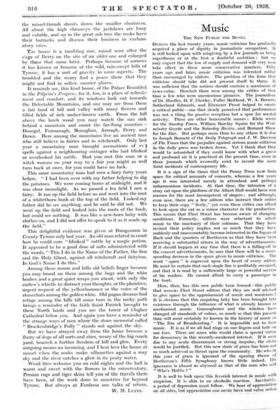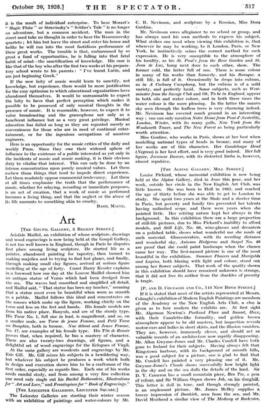M u s i c
THE NEW PUBLIC FOR MUSIC.
DURING the last twenty years, music criticism has gradually acquired a place of dignity in journalistic occupation. It
is still looked upon with misgiving by a few journals as being
superfluous or at the best a doubtful ambition ; but we may expect that the law of supply and demand will very soon take effect in these more conservative quarters. Fifty
years ago and later, music criticism was tolerated rather than encouraged by editors. The problem of the form that
criticism should take did not present itself to them. It was sufficient that the notices should contain a maximum of news-value. Howbeit there were among the critics of that 'time a few who were unconscious pioneers. The journalism of Dr. Hueffer, H. F. Chorley, Fuller Maitland, W. A. Barrett; Sutherland Edwards, and Ebenezer Prout helped to create a critical public—one that slowly perceived- that performance was not a thing for passive reception but a spur for mental activity. There are other honourable names : Klein wrote for the Sunday Times, William Barclay Squire for the West- minster Gazette and the Saturday Review, and Bernard Shaw for the Star. But perhaps more than to any others it is due to Joseph Bennett of the Daily Telegraph and J. W. Davison of The Times that the prejudice against serious music criticism in the daily press was broken down. Yet I think that they would be astonished if they could know with what a grave and profound air it is practised at the present time, even in those journals which avowedly exist to record the more lurid incidents of contemporary life.
It is a sign of the times that the Penny Press now finds Space for critical accounts of concerts, whereas a few years ago it was interested merely in attendant and perhaps unharmonious incidents. At that time, the intrusion of a stray cat upon the platform of the Albert Hall would have won renown for the most incompetent of singers ; and although; even now, there are a few editors who instruct their critics to keep their copy " lively," yet even these critics can afford to look upon the cat as a minor character in the production. This means that Fleet Street has become aware of changing conditions. Formerly, editors were reluctant to admit music to the sanctuary of their columns. That they have revised their policy implies not so much that they have suddenly and unaccountably become interested in the fugues of Bach and the quartets of Beethoven as that they have been receiving a substantial return in the way of advertisements. If it should happen at any time that there is a falling-off in the concert advertisements, be sure that there will be a corre- sponding decrease in the space given to music criticism. The word " space " is engraved upon the heart of every editor. He must be certain that each single line is profitably occupied, and that it is read by a sufficiently large or powerful section of his readers. He cannot afford to carry a passenger in the boat.
How, then, has this new public been formed—this public that assure; Fleet Street editors that they are well advised to give space to the appraisement of music and musicians ? It is obvious that this enquiring laity has been brought into existence through the influence of what is already known as mechanised music. Gramophones and the wireless have changed all standards of values, so much so that this present time will most certainly be known in the history of music as " The Era of Broadcasting." It is impossible not to hear music. It is as if we all had rings on our fingers and bells on our toes. There are some who would claim a special virtue for democracy in this recently-awakened interest. If it were due to any acute discernment or strong impulse, the claim would be justified. But this new state of grace has been not so much achieved as thrust upon the community. He who in this year of grace is ignorant of the opening theme of Beethoven's Fifth Symphony knows little indeed. His ignorance is almost as abysmal as that of the man who said " Who's Hobbs ? "
It is well to look upon this feverish interest in music with suspicion. It is akin to an alcoholic reaction. Inevitably, a period of depression must follow. We hear of appreciation on all sides, but appreciation can never have real value unless it is the result of individual enterprise. To hear Mozart's " Magic Flute " or Stravinsky's " Soldier's Tale " is no longer an adventure, but a common accident. The man in the street need take no thought in order to hear the Rasoumovsky quartets ; let him but leave the street and enter his house and belike he will run into the most fastidious performance of these great works. The trouble is that, embarrassed by so great a fund of opportunities, he is falling into that fatal habit of mind—the sanctification of knowledge. His case is like that of the boy who after the first two weeks at his prepara- tory school wrote to his parents : " I've learnt Latin, and am just beginning Greek."
If the new laity of music would learn to sanctify, not knowledge, but experience, there would be more justification for the easy optimism to which educational organizations have abandoned themselves. It would be unreasonable to expect the laity to have that perfect perception which makes it possible to be possessed of only musical thoughts in the presence of music. It is reasonable, however, to expect it to value broadcasting and the gramophone not only as a beneficent influence but as a very great privilege. Musical education has failed so long as they are regarded merely as conveniences for those who are in need of continual enter- tainment, or for the ingenious occupations of amateur engineers.
Here is an opportunity for the music critics of the daily and weekly Press. Since they owe their widened sphere of influence to the existence of a public interested as yet only in the incidents of music and music making, it is their obvious duty to vitalize that interest. This can only be done by an intense concentration upon purely musical values. Let them eschew those things that tend to impede direct experience. Let them resolutely oppose commercial irrelevancy. Let them at all times emphasize the truth that the performance of music, whether for relaying, recording or immediate purposes, is an act of creation, that a work. of music so performed becomes a living thing, and that the neglect or the abuse of its life amounts to something akin to cruelty.
BASIL MAINE.































































 Previous page
Previous page